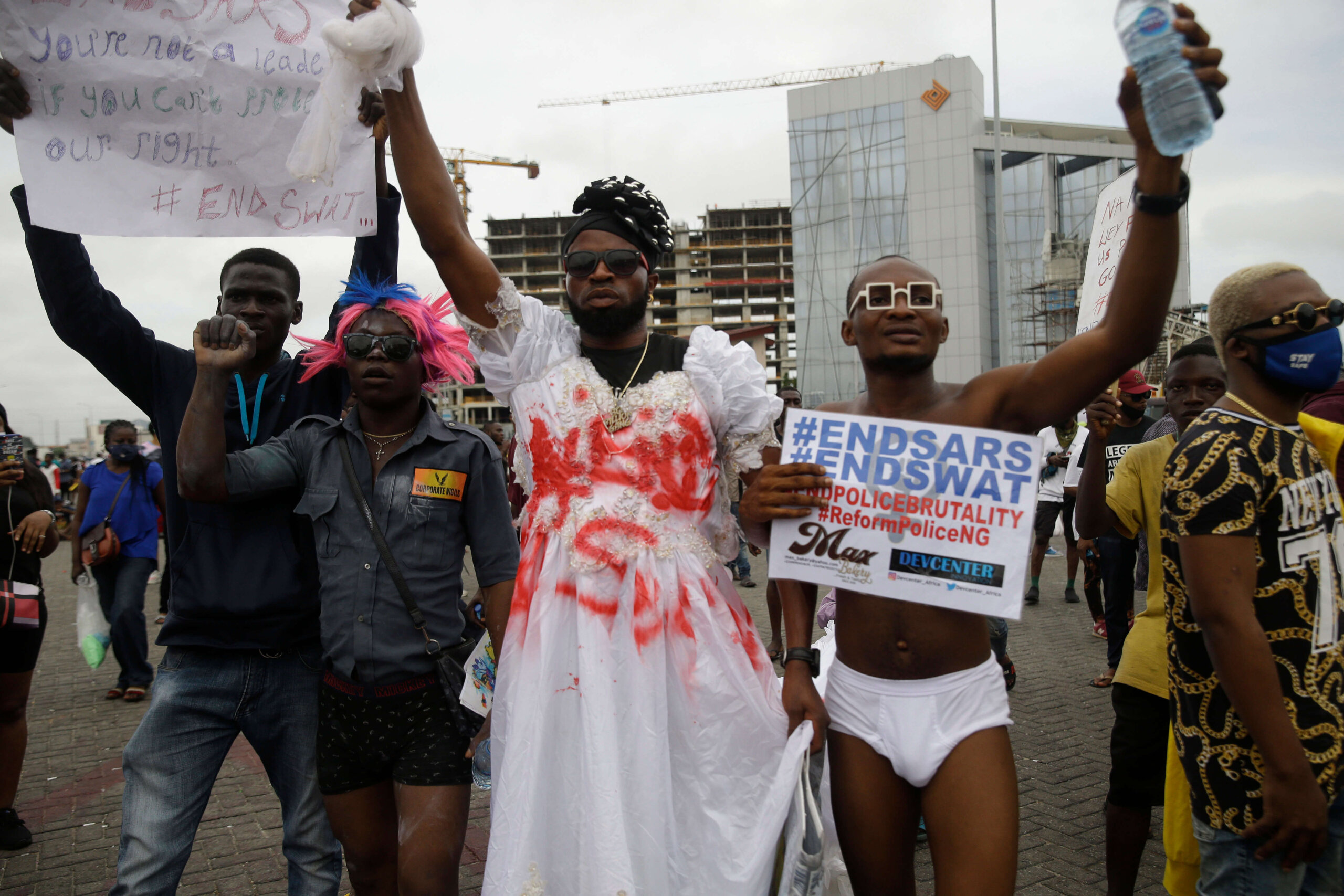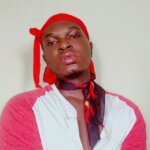Every week, Victor Emmanuel spends his time inside his tiny apartment trying to carve a muse out of himself. The 22-year-old from the small city of Enugu, Nigeria, makes YouTube videos about queer culture in the country—skits and commentary about the endless mental gymnastics attached to it, its sad assumptions and its exhausting dangers. For every queer person who subscribes to and watches Emmanuel’s YouTube channel “For Fags Sake!,” there’s a keen sense of relatability and even a little humour.
Emmanuel started making videos about queer Nigerian culture in August 2019 when he realized how rare it was to find good LGBTQ+ representation created for and by members of the community. “There are a lot of skits and skit-makers in Nigeria, but there aren’t any queer skits that I know of,” Emmanuel says. “And even when there are elements of queerness in some skits, they are usually negative. They either bash the LGBTQ+ community or misrepresent it. So I wanted to give queer people good representation.”
Emmanuel currently has a scant 804 subscribers on YouTube. But that doesn’t stop him from creating content in hopes that his videos can make a small impact on queer Nigerians like him. “I know the struggles, and I keep making content so other people can see themselves in me,” he says.
That kind of representation can be incredibly meaningful. For decades, the Nigerian LGBTQ+ community has faced discrimination and hardship in a cisheteronormative society tinged with extreme religious fanaticism. Many face homophobic friends and family. Even worse, LGBTQ+ Nigerians are denied recognition before the law: Those caught engaging in homosexual activity can face up to 14 years of imprisonment under the Same Sex Marriage (Prohibition) Act, signed into law in 2014 by former president Goodluck Ebele Jonathan.
Last summer, some queer activists tried to address that discrimination publicly. The #EndSARS movement began as a result of the oppression and tyranny faced by young Nigerians—particularly queer Nigerians—by the Special Anti-Robbery Squad (SARS). The protest, which lasted nearly a month, saw popular queer activist Matthew Blaise screaming “queer lives matter” thrice on a street in Lagos. It was a salient moment in the #EndSARS protest: A video of Blaise and other activists amassed more than 3 million views, and #QueerLivesMatter was a trending topic on Twitter.
The next day, queer Nigerians joined the protest physically with “Queer Lives Matter” placards. But that didn’t stop the discrimination from happening. Queer YouTuber Amara, the lesbian. made a video recounting the scene: In it, Amara describes how opposing forces tore protester’s placards, seized their flags and were violent toward them.
Still, the Nigerian LGBTQ+ community is surrounded by a strong shield of activism—the sort that has embraced the community, given them a reason to fight for acceptance and helped the country move closer to the legalization of queer rights. That activism takes on many shapes, from making YouTube videos like Emmanuel does to taking to the streets in protest.
Emmanuel wants to see more of that in-person fighting. “I want a physical pushback,” he says. “The work we do online is phenomenal and amazing, but as we know, in Nigeria, our government doesn’t listen until we disrupt the everyday workings of this country like we did during the #EndSARS movement. If we can borrow a leaf from queer icons like Marsha P. Johnson and Sylvia Rivera, we know that the liberation we seek can never be gotten by being polite, afraid or civil.” Emmanuel also wants to see more LGBTQ+ Nigerians represented in mainstream media (“That too is a form of protest”) and more inclusive spaces for queer folks.
Others are following Emmanuel’s lead, harnessing the power of independent community media to reach other LGBTQ+ Nigerians in their fight for more inclusivity.
“What we fight for now, we might not see in our lifetime, but we have to keep fighting.”
In 2017, Mariam Sule was still discovering herself as a queer woman when she reached out to two friends to talk more about her experiences as an LGBTQ+ Nigerian. Together in her apartment in the western Nigerian city of Ilorin, the three shared their struggles of being out in a country that doesn’t accept them. The conversations were so inspiring to Sule that she decided others should hear them, too: She founded The Pride Diaries, a podcast all about being queer in Nigeria.
Sule’s podcast, like Emmanuel’s videos, has become an avenue to push for change. “Activism is a tool, a lived experience, an endless thing,” she says. “What we fight for now, we might not see in our lifetime, but we have to keep fighting because we know it is possible and we are imagining what it will look like and we are fighting towards that.”
Enit’ayanfe Adeniyi, meanwhile, tells queer stories in a column on Facebook. When I ask him about the future of queer activism, he points to the progress already made. “I think it is already evolving. This year alone, some Nigerians made the choice to come out of their closet—and I think we can attribute such a solid act to the constancy of the queer activism so far in Nigeria,” he says.
Emmanuel, Sule and Adeniyi are all finding innovative ways to keep the conversation around LGBTQ+ realities in Nigeria moving. They also represent the importance of keeping hope: It opens our imagination, gives us a glimpse into a thriving future and helps us move forward. Whether it’s creating space online or marching in the streets, more and more LGBTQ+ Nigerians are offering representation, consistently seeking acceptance and greater protections. In time, these activists hope, we will get there.
Correction: May 5, 2021 3:47 pmA previous version of this story incorrectly stated that Mariam Sule and her friends created The Pride Diaries together. Sule created the podcast on her own. The story has been updated.


 Why you can trust Xtra
Why you can trust Xtra


